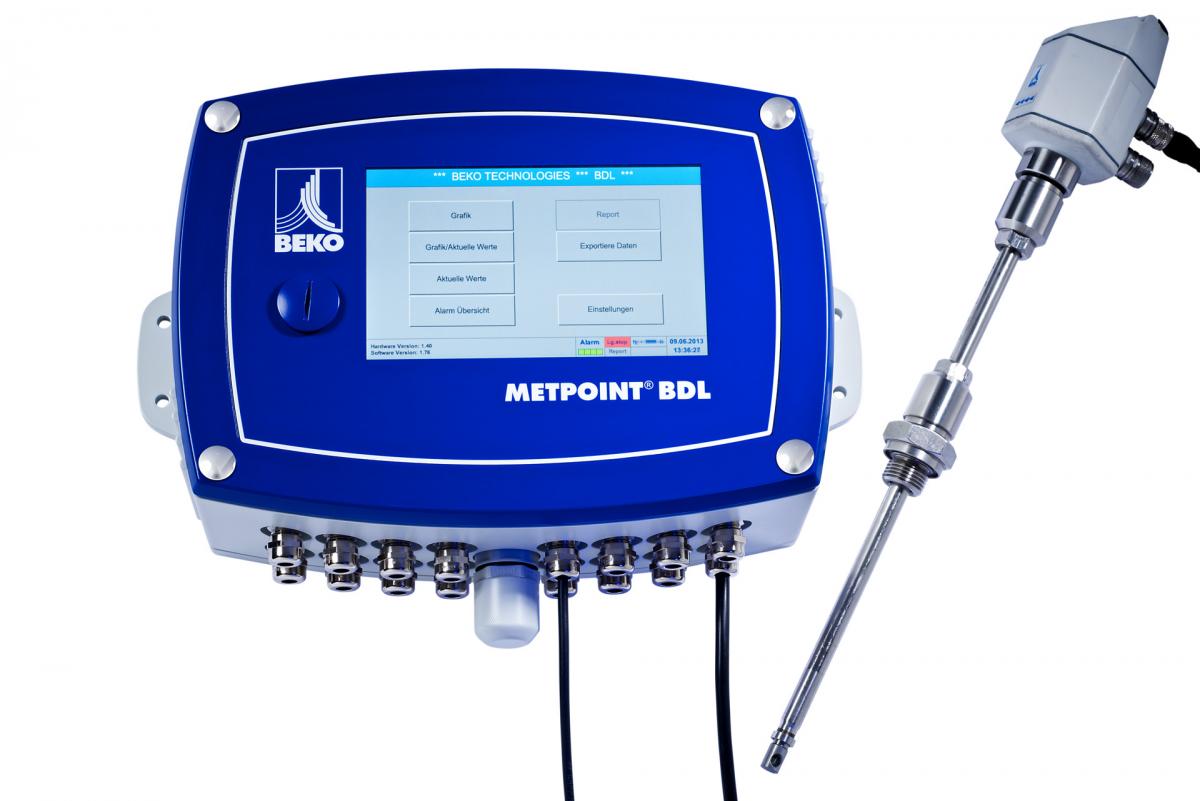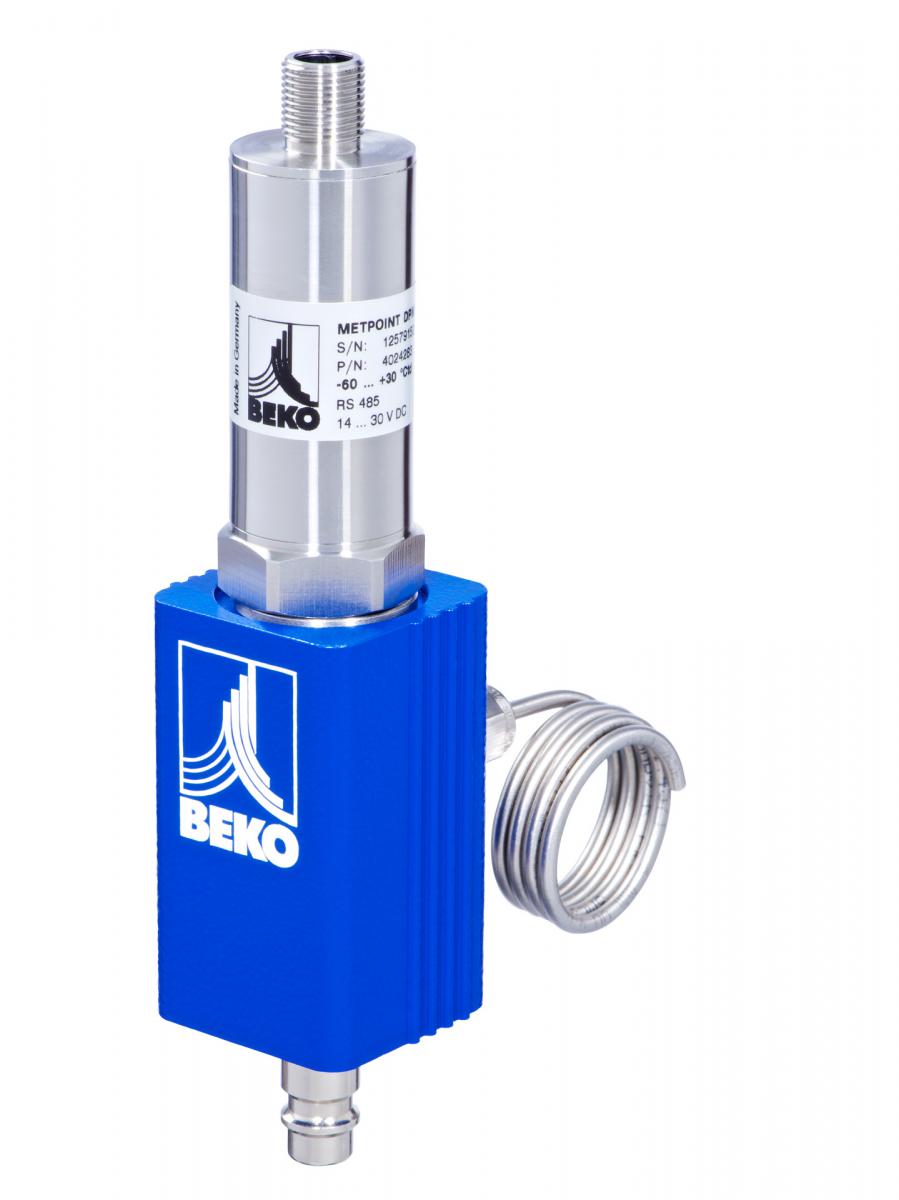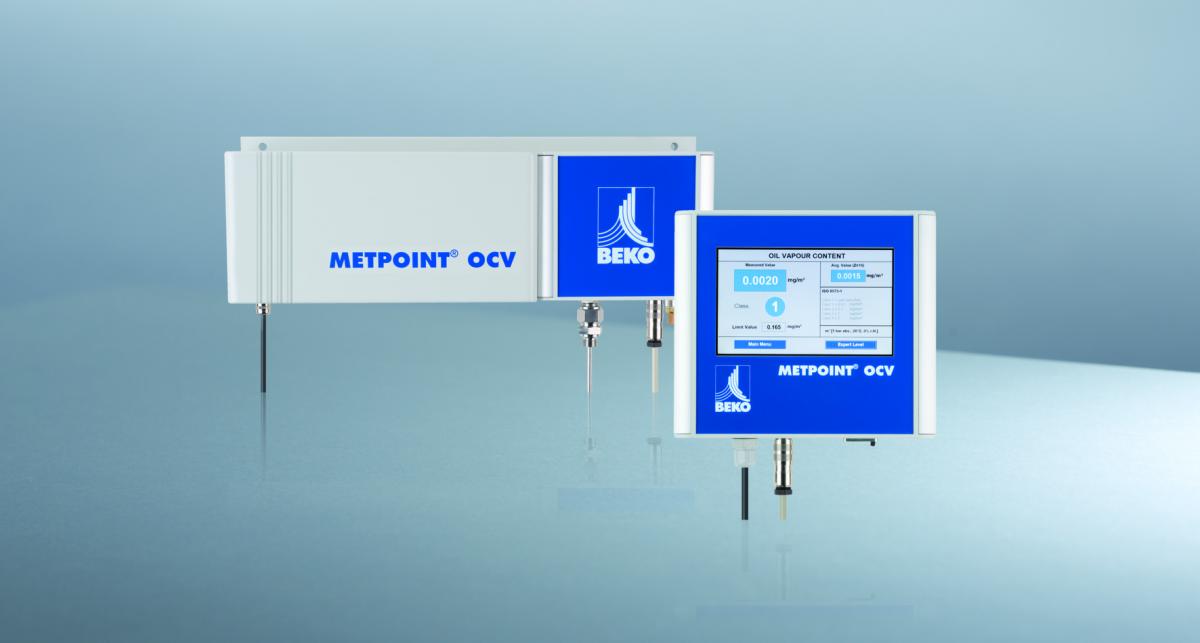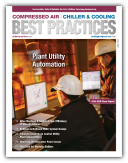Phillip Kruger, general manager of Harris Equipment Corp., Melrose Park, Ill., is on a mission to help food processing companies achieve SQF (Safe Quality Foods) Certification when it comes to the proper use of compressed air systems. In fact, Harris Equipment acts as a consultant to these companies, helping clarify some of the vague details left out of the SQF directive.
“Basically, we help our clients identify the methods in which they can get approved by SQF,” Kruger says. “By establishing some sort of standards to the directives, we are able to help our clients create a plan that aligns itself with the SQF directives, which, quite frankly, are vague.”
A privately held company, Harris Equipment has been providing industrial service and sales to the Chicago-area market since 1936. The company’s offerings include a wide range of air compressors.

Gary Pollack and Phillip Kruger (left to right) of Harris Equipment.
Compressed Air in Food Processing
Compressed air is used in a broad range of applications in the food processing industry such as mixing of ingredients, cutting, drying of product, transporting product through processing systems and packaging of final product.
In many of these applications, compressed air comes in direct or indirect contact with food product and the impurities in the compressed air may contaminate the food product. This can result in change of color and taste, reduced shelf life and exposure to bacteria and other microorganisms, which can result in product recalls.
The SQF Food Safety Management System is designed to prevent such problems from occurring. “SQF is recognized by retailers and foodservice providers around the world who require a rigorous, credible food safety management system,” the group states on its website. “Administered by the Food Marketing Institute (FMI), SQF benefits from continual retailer feedback about consumer concerns. These benefits are passed on to SQF-certified suppliers, keeping them a step ahead of their competitors.”
SQF is a food safety management company that conducts audits and reports its findings on companies that voluntarily subscribe to its services. Once an audit is performed, SQF releases the data; from this data, other companies can determine who they want to use for packaging and manufacturing. To facilitate the process, SQF has released a guide that provides directives for processes used in manufacturing.
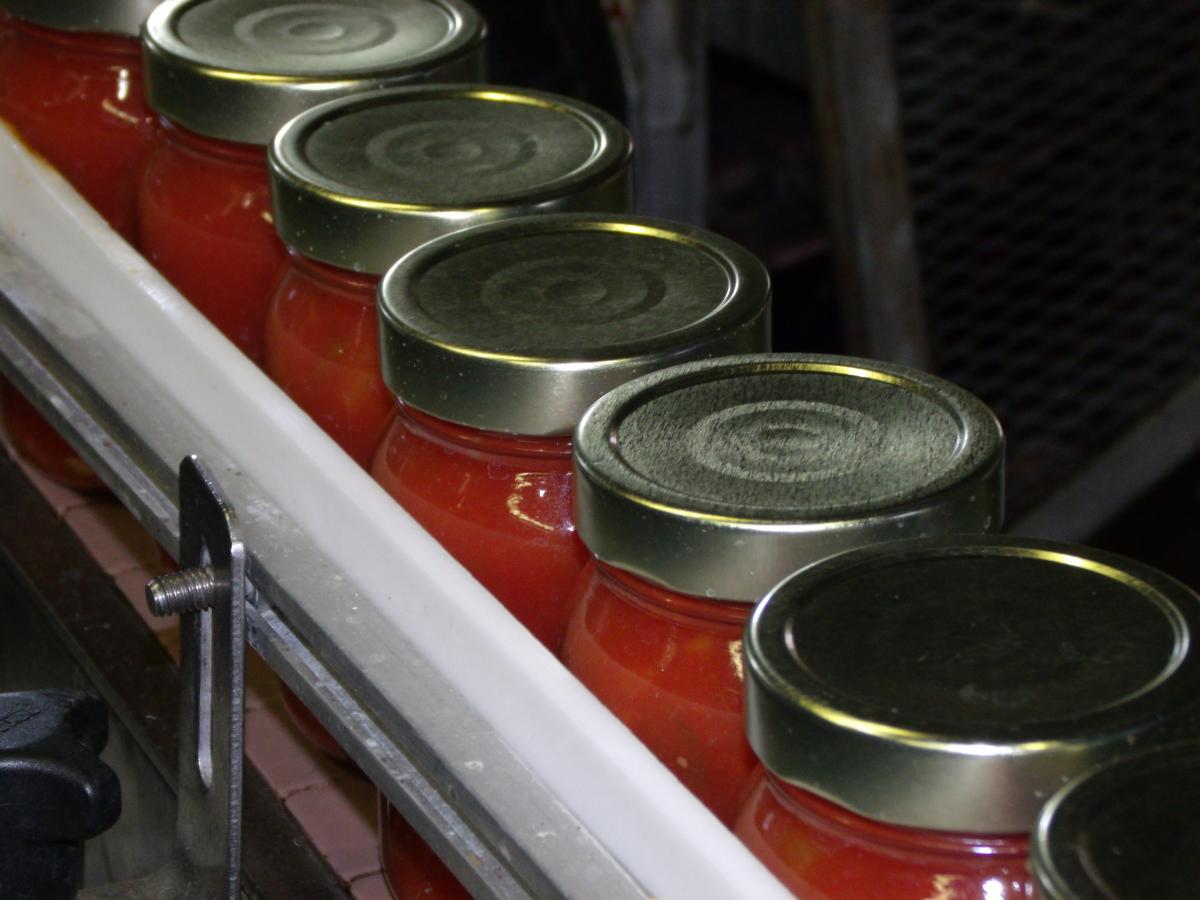
Food processing companies that are not testing their process air or gas, risk contaminating their product.
Seeking Quantifiable Standards
However, when it comes to the use of compressed air, SQF does not offer quantifiable standards, says Kruger. “What is clean? What is monitored and how frequent is regularly? This is where Harris Equipment comes in. I’ve had clients who were tired of feeling pressure due to the ambiguous standards.
“Typically a customer is asked to prepare for an SQF audit and has no idea where to begin. That’s when they call us. We start by asking them what it is they want us to help them accomplish. We then take an inventory of their current system and the application. From that stage, we are able to put together a profile and assign it an ISO Quality Class per ISO 8573-1.
“We then discuss the different ISO classes and what they mean. From there, the customer tells us what they would like their classification to be; we then detail out the proper equipment and installation to achieve the desired classification.”
Harris Equipment recommends monitoring equipment and third-party testing and suggests equipment and tests that fit the customer’s goals. “Some companies are looking for microbiological cultures while others are looking for standard moisture and particulate testing,” Kruger explains. “It is up to the customer and is based on what they want their system tested for. In addition, the customer determines the frequency of testing. I don’t know that what we are doing is the absolute, but it is a start and it helps clients who are facing the SQF challenge.”
Why is it important to help clients achieve an SQF approved status? It helps food processing companies secure additional business in a competitive market.
Jar washer using compressed air.
Details of the Process
When working with food processing companies, Harris Equipment strives to teach them what can be done to achieve SQF approved status. There are three major parts of the process:
a) Determine the quality of compressed air the company currently has
b) Determine the quality of compressed air the company wants
c) Plan the equipment selection, installation and implementation phase
“If they’re looking for a certain classification where a 30-degree dew point is acceptable, then we would quote the right piece of equipment. If they are looking for quality of air where a negative 40 dew point is to be their standard, then we would quote the right dryer” Kruger says.
This all ties into the first SQF directive: compressed air shall be clean and present no danger. Harris Equipment makes sure that the right equipment is chosen, so that it does not create a dangerous environment.
“We look at equipment components such as the food-grade oil compressor and different stages of filtration, and make sure everything is installed correctly and can maximize the mechanical separation of water from air.” This is more of an investigative process: taking inventory, showing companies what they have, finding out what they want and determining what it will take to get them there.
The second part of the process involves regular monitoring. Part of this involves implementing a maintenance program—making sure that food-grade oil is changed according to schedule (it has a shorter life than other oils); making sure the filters are changed on time; making sure timer drains are working properly; making sure that dryers are cycling correctly.
Harris also implements a remote dew point monitoring system, which ensures that no condensate, which can cause microbial growth, builds up throughout the plant. Kruger and his team initiate a hydrocarbon monitoring system (checking oil to make sure there are no high levels of hydrocarbons). The last part involves documentation—making sure the company documents the testing and monitoring of the process over time. “So what we do, basically, is put together a plan for these food processing companies. This plan helps them prepare for SQF auditing” Kruger notes.
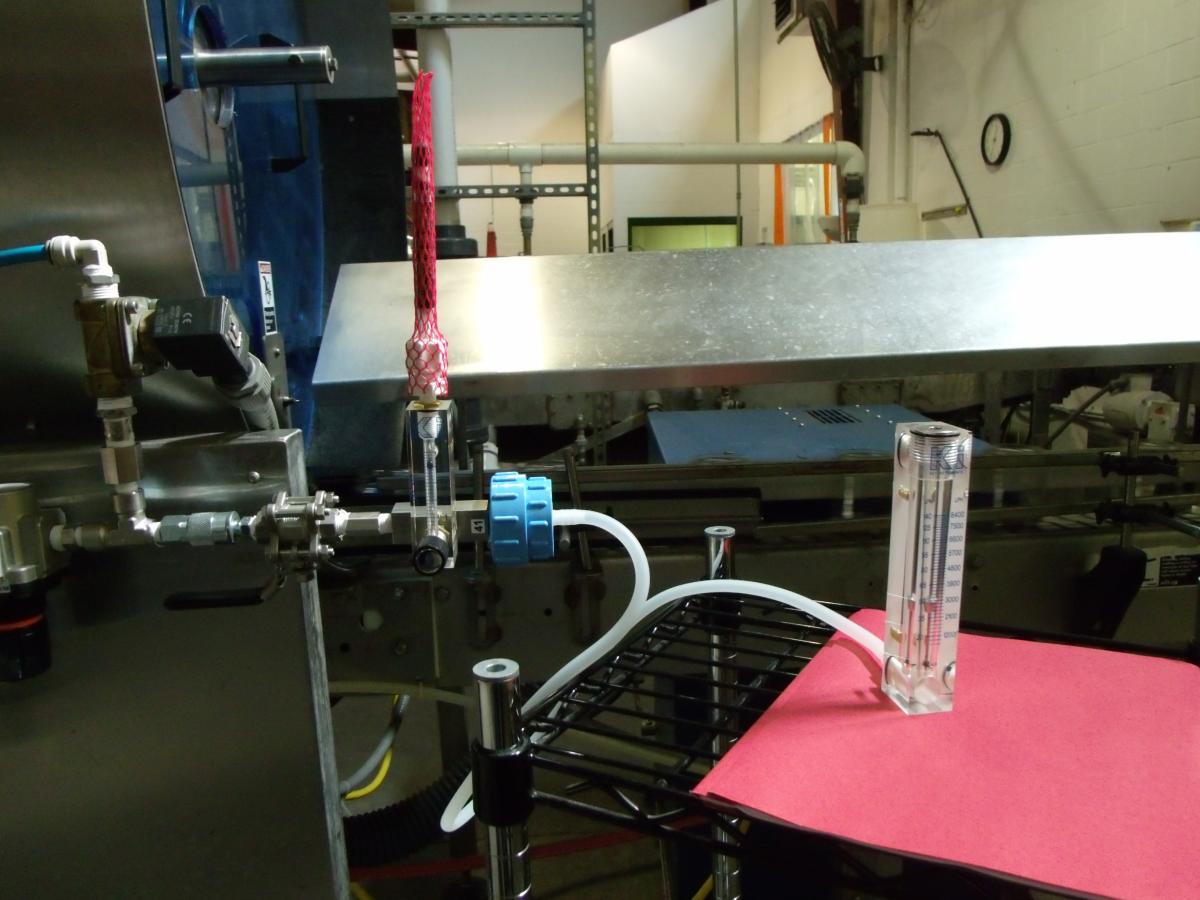
An air sample is captured before being sent to Trace Analytics for analysis.
Monitoring Equipment
BEKO Technologies Corp., Atlanta, manufactures monitoring equipment that is used by food processing companies, which can help them achieve SQF certification. “Typically, food companies are mandated to monitor their hydrocarbon carryover from the compressed air system because the compressed air could come in contact with the food product or packaging,” says Pam Tetterton, product/project manager. “In years past, this was done by taking a sample and sending it out to a local lab to have it analyzed. This process could take up to two weeks to determine whether a batch of products could be released or needed to be scrapped.”
To fill this need, BEKO Technologies has developed an inline hydrocarbon monitoring system (METPOINT OCV), which continuously monitors and documents the residual oil content of flowing compressed air. Even the smallest amounts of oil are detected, giving early notice of the possible contamination of pipe work and products. When critical points are reached in the system, the user is able to immediately react to deviations in a proactive manner.
“If the food processing company wants oil-free air, BEKO Technologies offers a hydrocarbon removal system (BEKOKAT)” Tetterton adds. “Unlike activated carbon towers that adsorb the vapors, this system cracks the molecular structure of the hydrocarbon chain, so you are left with H2O & CO2.” The end user can save money by purchasing an oil flooded compressor along with a BEKOKAT hydrocarbon removal system and the METPOINT OCV hydrocarbon monitoring unit.
|
The BEKO METPOINT® BDL monitor and data logger is capable of accepting up to 12 sensors per unit (shown with a flow sensor attached). |
The newly redesigned METPOINT® dew point meter is available from BEKO Technologies. |
|
|
Available from BEKO Technologies, the METPOINT® OCV is capable of monitoring the presence hydrocarbons in compressed air. |
Laboratory Analysis
Trace Analytics LLC, Austin, Texas, an A2LA-accredited laboratory that specializes in the analysis of compressed air and gases, also provides equipment that is used in achieving SQF certification. The company offers the rental or purchase of compressed air sampling equipment. Its K8573 AirCheck Kits are based on ISO 8573 and are used in conjunction with Trace’s laboratory analyses for particle count and size beginning at 0.5 microns, water vapor, and total oil including oil aerosol and oil vapor, and optional gases.
“Some of our customers require particle sizing to the smallest range of 0.1 micron,” says Laura Gunn, marketing director. “For them, we offer the rental of a laser particle counter for immediate onsite results of all three particle size ranges specified in ISO 8573.
Our impaction sampler is used for microbiological sampling. This method allows for reporting of colony forming units (CFUs) as low as zero and further identification if requested by the customer. We can arrange analyses by an A2LA-accredited laboratory or the samples can be analyzed by the customer’s preferred micro lab.”
Trace Analytics encourages its customers to work with reputable distributors such as Harris Equipment. “Working with professional service companies is crucial to maintaining the quality of compressed air. Regular maintenance, proper filtration and using dryers appropriate for the application are all important to maintaining clean compressed air.”
Conclusion
SQF is only a small part of the international food safety initiative, experts agree. It is just one of many organizations that work under the GFSI umbrella. The goal of all of these organizations is to ensure a safe food supply across the world. Determining how to apply those standards to the safe use of compressed air in food processing is still a work in progress—a goal that Harris Equipment is striving to achieve.
Author Bio
Neal Lorenzi is a freelance writer based in Mundelein, Ill. He has covered a wide range of industries during his 25 years as a writer and editor.
For more information please visit: Harris Equipment at https://www.harrisequipment.com, BEKO Technologies Corp. at https://www.bekousa.com and Trace Analytics LLC at https://www.airchecklab.com.
To read similar articles on Standards for the Food Industry, visit www.airbestpractices.com/standards/food-grade-air.

